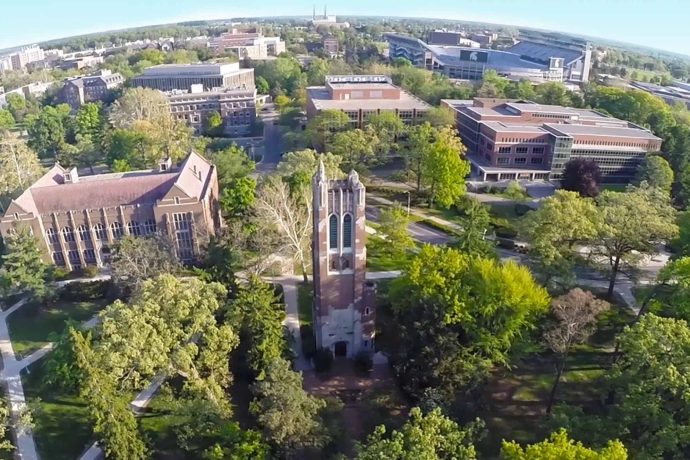- It’s possible to change the university. Critique only goes so far; other crucial skills include imagination, creativity, courage, and risk-taking.
- Acknowledge the sacrifice, labor, and dreams of those who came before you. Brown and her colleagues locate themselves in Black feminisms, which allows them to draw from and extend powerful “blueprints” of community building, organizing themselves, and creating change.
- Remain ready for future generations. Think about creating something that will outlast an individual lifetime.
- The most important resources are people and their relationships with each other. Prioritize supporting these relationships, your team, and the well-being of faculty.
- Be willing to do things differently than the way they’ve always been done. Brown believes that what’s needed now, more than ever, is “unconventional” leadership in the academy.
Michigan State University Department of African American and African Studies

The African American and African Studies Department (AAAS) at ACLS Associate Member Michigan State University (MSU) shows that imagining and building a department can yield new possibilities and outcomes. Ruth Nicole Brown was hired as the inaugural chair of AAAS in 2020 and given the charge to lead and create the department. AAAS had been initially founded in 2002 as an interdisciplinary PhD program and had added an undergraduate minor in 2014.
In an act of what Brown calls “radical generosity,” colleagues from other departments were very supportive; the creation of a new department of AAAS was a priority for everyone in the College of Arts & Letters. Importantly, the call to create a department rooted in Black feminisms, Black gender studies, and Black sexuality studies distinguished the department within the field of Black studies and motivated all who were newly hired. Brown also felt supported by the administration, including Dean Christopher Long, who emphasized values-driven leadership in the college. One of the first actions during the first year was to propose a BA.
Beginning with the BA, as opposed to a PhD, was an intentional choice. Working with the mantra “Our students are our greatest why,” the curriculum is creative, flexible, and integrates theory, practice, and praxis. Each course was new to the department and represented the dream courses that the faculty wanted to teach and felt were necessary to Black Studies. The introductory course for majors and minors, “Pathways in AAAS,” is followed by three courses: Black Feminisms, Black Genders Studies, and Black Sexualities Studies. (Minors choose two of these three courses.) In addition to upper-level electives, majors focus on one of three concentrations for nine credits: Communities in Action; Creative Expression, Culture, and Performance; and Black Institutions, Sustainability, and Statecraft. The result is a program whose purpose is “to provide an integrative education that engages conditions of Blackness locally and transnationally” with a focus on “community and cultural works, cultivating radical imagination, and collective revolutionary knowledge production.”
Since the new department was established, AAAS currently has 11 faculty, 15 majors, and 70 minors. This year is momentous for AAAS as the first three AAAS majors in Michigan State University’s history graduate this spring. Plans to launch the graduate program are in the works with Dr. LeConté J. Dill named Director of Graduate Studies, one of three Associate Chairs in the department.
Brown observes that the process of creating the new department seems similar to creating a startup business. She relied heavily on her experiences having created and continuing to co-organize SOLHOT (Saving Our Lives Hear Our Truths), a community for Black girls dedicated to celebrating Black girlhood. This prior experience helped her understand that she could create things while in the university that were not of the university. She also cites philosopher activist Grace Lee Boggs’s social justice collective, Detroit Summer, as showing her what’s possible when education and revolution are brought together. Drawing from a tradition of Black feminist thought and activism allowed her and her colleagues to imagine “how to do the university differently.” This vision is reflected in the “Values and Practices” that guide the faculty in their work with each other and their students, a co-created and living document included on the AAAS website.
AAAS has attracted outside support for its work. In 2023, a generous gift from the Michigan-based Adrian Dominican Sisters enabled the department to provide student scholarships and funds for faculty to create student engagement initiatives and experiential learning opportunities. Brown envisions a future where their students will continue to thrive, AAAS will make a meaningful impact in the community, and they will remain experimental and take risks that allow them to prioritize education and joy as central to the new build.

